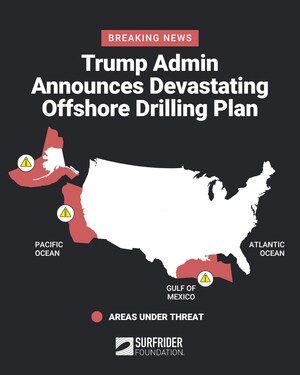
SAN CLEMENTE, Calif., July 14, 2020 /PRNewswire/ -- The Surfrider Foundation is pleased to release the 2019 Beach Cleanup Report, highlighting the impact of our national Beach Cleanup program and presenting regional stories, current science and how beach cleanup data can be used to create large-scale policy change. The results from Surfrider's 2019 Beach Cleanup Program confirmed our current reality that plastic is the most common material found on the beaches and the percentage of microplastics continues to increase. Nine out of the top ten items collected on the beaches were plastic, and 25% of all items collected were plastic fragments smaller than a dime.
Surfrider's Plastic Pollution Initiative uses a multi-pronged approach to reduce plastic pollution, and the Beach Cleanup program is the first step in addressing the amount of plastic ending up in our waterways, on our beaches and ultimately in the ocean. Our volunteer chapter network conducts local beach cleanups across the nation and removes hundreds of thousands of pounds of trash and recyclables each year. During 2019, 47,059 Surfrider volunteers held 936 beach cleanups and removed nearly 300,000 pounds of trash and recycling from our beaches. Without the efforts of Surfrider volunteers, this waste would end up in the ocean where it could harm marine life and damage crucial ecosystems, as well as adversely affecting human health and local economies that rely upon tourism generated revenue along our nation's coasts.
Beach cleanups and data collection play a crucial role in enabling us to learn more about the types of plastic ending up on our beaches. Without this data, the effectiveness of the program would decrease and beach cleanups would be a reactionary response to plastic pollution. Whereas with this data, we are able to work proactively to reduce plastic pollution before it gets to the beach by influencing laws that reduce the use and production of single-use plastics, and track trends in trash data to show the effectiveness of policy in keeping plastics off of the beaches in the first place. It gives Surfrider activists critical insights into what items are most often found on beaches and the tools to use this data to create meaningful change at the local, state and national levels.
Our beaches are also suffering negative impacts from the coronavirus outbreak. Increased takeout foodware and single-use packaging, improperly discarded personal protective equipment (PPE) and limited volunteer events to clean the beach has led to increased reports of plastic on our coastlines. In response to the increasing reports of finding masks and gloves on the beach this spring, we quickly adapted our cleanup data form to include PPE to help better understand the lasting environmental impacts COVID-19 has on our beaches.
You can view the complete 2019 Beach Cleanup Report here. We encourage you to connect with your local Surfrider Chapter to participate in their beach cleanup program, including solo cleanup efforts that will help keep our beaches clean while respecting social distancing guidelines. When we all work together to fight single-use plastics, we can keep our ocean and beaches clean from plastic pollution today and for future generations.
About the Surfrider Foundation:
The Surfrider Foundation is a nonprofit grassroots organization dedicated to the protection and enjoyment of our world's ocean, waves and beaches through a powerful network. Founded in 1984 by a handful of visionary surfers in Malibu, California, the Surfrider Foundation now maintains over one million supporters, activists and members, with more than 170 volunteer-led chapters and student clubs in the U.S., and more than 700 victories protecting our coasts. Learn more at surfrider.org.
SOURCE Surfrider Foundation






Share this article